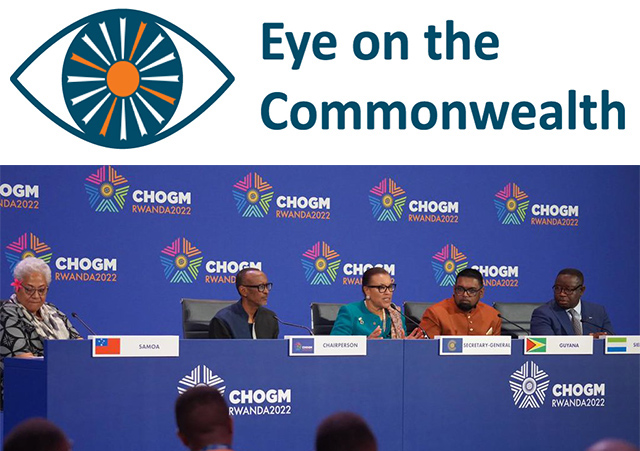 Samoan Prime Minister Fiamē Naomi Mata’afa: The next CHOGM will be an ‘opportunity to refocus the Commonwealth on small states’. [photo: Commonwealth Secretariat]
Samoan Prime Minister Fiamē Naomi Mata’afa: The next CHOGM will be an ‘opportunity to refocus the Commonwealth on small states’. [photo: Commonwealth Secretariat]
Samoa was named as the host of the next Commonwealth heads of government meeting, due to take place in 2024. It will be the first time the summit has been held in any of the Pacific nations. The decision was announced as this year’s CHOGM in Rwanda’s capital, Kigali, was drawing to a close.
There will also be two new member states in Samoa after Gabon and Togo were admitted to the organisation, even though the French-speaking west African countries – like Rwanda and Mozambique – have no historic ties to Britain.
Speaking at the concluding CHOGM press conference, the Samoan prime minister, Fiamē Naomi Mata’afa, gave some hints about what she had taken away from her time in Rwanda and how her country would approach hosting the summit, which she said would be all about the ‘island experience’ and provided an ‘opportunity to refocus the Commonwealth on small states’. She suggested that the logistics would be a challenge, but pointed out that Samoa had hosted the Small Island Developing States conference in 2014.
Talking about her meeting with youth delegates at the conference, Fiamē said: ‘It’s not enough to just have governments determine the development programme and objectives. It has to be the whole of society to carry us through if we want to reach the goals we have set.’ It would be a chance, she said, ‘to reimagine our futures’.
‘Diplomatic coup’
While acknowledging the ‘development challenges currently being faced’ by the country, a Samoa Observer editorial hailed the ‘diplomatic coup’ that its politicians had pulled off, looking forward to the ‘immense’ benefits for the ‘dilapidated tourism and hospitality sector’.
Meanwhile, news of the admission of Gabon and Togo has raised questions again about members’ commitment to the Commonwealth Charter, which enshrines the principles that supposedly guide the organisation as a ‘compelling force for good’. The Commonwealth Secretariat’s press release noted that ‘an applicant country should demonstrate commitment to democracy and democratic processes, including free and fair elections and representative legislatures; the rule of law and independence of the judiciary; good governance … transparent public accounts; and protection of human rights, freedom of expression, and equality of opportunity.’
However, both countries have been under dynastic rule for decades. Gnassingbé Eyadéma reigned over Togo for 38 years until his death in 2005; his son, Faure Gnassingbé, has ruled since then. The country’s key phosphates industry – which accounts for 40% of expert revenues – is controlled by the president. Gabon was ruled by Omar Bongo from 1967 until his death in 2009 – when he was the world’s longest-reigning head of government – and was also succeeded by his son, Ali Bongo, who has ruled since then. The thinktank GlobalSecurity.org said: ‘A chokehold of corruption and monopolies, centered on the Bongo family, thwart genuine competition and much-needed economic diversification.’
Values
Welcoming the admission of Togo and Gabon, the Commonwealth secretary-general, Patricia Scotland, said: ‘I am thrilled to see these vibrant countries join the Commonwealth family and dedicate themselves to the values and aspiration of our Charter.’
However, the Togolese government made it clear that commercial and educational opportunities had been the main reason to join the Commonwealth. The foreign minister, Robert Dussey, said the country’s ‘motivation is to grow our diplomatic, political and economic network’ and ‘to forge closer ties with the anglophone world’. He said he expected Commonwealth membership to benefit exports, help fund development projects, as well as providing opportunities for the Togolese to learn English and access new educational and cultural opportunities. The Gabonese foreign minister, Michael Moussa Adamo, said joining would boost economic diversification while maintaining relations with France. Bongo ‘believes joining the Commonwealth is about modernisation’.
Transparency International’s corruption perceptions index ranked Gabon in 124th place out of 180 countries, with a score of 31/100, while Togo was 128th and scored 30/100.
The growing gap between the professed values of the Commonwealth and the reality in many member states was made clear by the Rwandan president, Paul Kagame, who succeeded Boris Johnson, his British counterpart, as chair-in-office of the Commonwealth at the Kigali Chogm. Asked by a BBC reporter about descriptions of a ‘climate of fear’ in Rwanda, he responded fiercely: ‘As far as values are concerned, we don’t need any lessons from BBC or from anyone,’ Kagame said in a half-hour defence of his country’s human rights record. ‘I want to assure you there is nobody … [upholding] values better than we do here in Rwanda.’
‘Cynicism’
Hosting a summit that will bring thousands of politicians and civil servants and journalists to Samoa, which is still recovering from the pandemic, will present a monumental challenge. But in many ways, the greatest challenge for the Pacific nation has already been overcome. As reported in the Round Table’s Commonwealth Update, Samoa’s first female PM had faced a constitutional ‘coup’ last July. To get to Kigali as Samoa’s prime minister, Fiamē had to negotiate the chicanery of an incumbent prime minister, Tuilaepa Sa’ilele Malielegaoi, who had refused to cede power, despite losing the general election, claiming he was ‘appointed by God’.
But in a worrying sign of how the ‘strongman’ model of government is increasingly becoming the norm, however, Fiamē said she had been ‘particularly taken with President Kagame’s leadership’ and dismissed what she called ‘cynicism about governments and leadership’, instead praising her ‘very reaffirming experience’ in Rwanda, which had illustrated the ‘roles and functions leaders can provide for countries’. As a South African political scientist told the New York Times: ‘Diplomatic alliances trump any human rights convention.’
Oren Gruenbaum is a member of the Round Table Editorial Board



